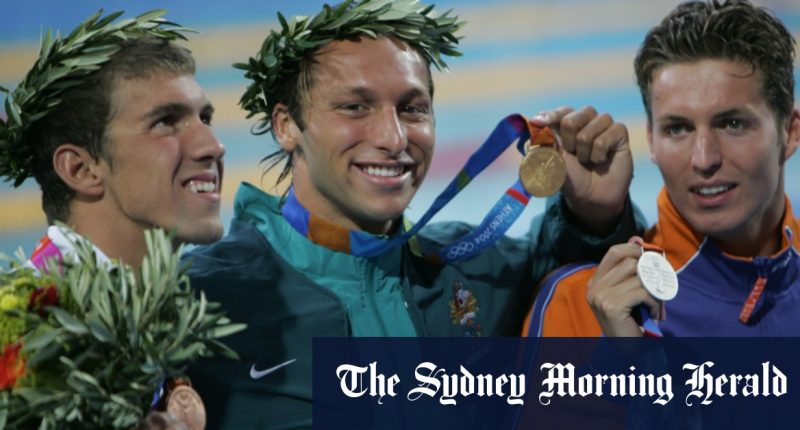Ian Thorpe was there, and Grant Hackett and Michael Klim and Andrew Gaze, all letting their hair down (Klim metaphorically) on the dance floor. Michael Phelps was there with a phalanx of minders smoking Cuban cigars. He had just turned 19. There were many recognisable basketballers and baseballers and rowers and boxers – and Prince Albert of Monaco.
In among them all on the riotous dance floor was a short, pale, balding man who was getting more female attention than is customary for short, pale, balding men on dance floors, except that this one had a gold medal around his neck. His name was Pete Cipollone, and he was the cox of the US’ triumphant eight.
This was the Sports Illustrated party at the Athens Olympics in 2004, a kind of unofficial mid-Games rave for athletes whose events were done, but whose Olympic experience was not. The setting was an exclusive nightclub on the beach at Kalamaki and the motif was bacchanalian.

The publication has been an institution in the US but has struggled in recent years.
Entry, via red carpet, was strictly by invitation or by flashing a gold medal. I think sports sage Roy Masters wangled an invitation for me, which was generous since he’d also had to share with me a one-bedroom apartment in the media village that fortnight.
The mood was unmistakably carefree. Days previously, Thorpe had beaten Phelps and Dutchman Pieter van den Hoogenband to 200 metres gold in the so-called “race of the century” (the century was then four years old!). At the Olympic club the previous night, Phelps had been besieged by sponsors and well-wishers, but here was wanted only as a dance partner. Thorpe came and went with his own driver, but otherwise was what he was then, a 21-year-old out for the night.
The evening was balmy, as all were at those Games. An orange half-moon shone and floodlights played across the clear, emerald waters of the Mediterranean.
Loading
The partygoers were young, athletic, (mostly) formidably tall, brown from the summer sun and glowing with good health. The air was thick with sexual tension, and it was not hard to see that some of it would be relieved that very night. Two young Americans began a romance on the spot, with the waters of the Mediterranean lapping at their feet.
The catering was, well, Olympian. There was a lamb on a spit, vast platters of snapper, prawn and calamari, bowls of olives, nuts and fruits, lashing of cheese and bread. Any minute, it seemed, Rome must fall, right there in Athens.
This was all the work of David Grant, an entrepreneurial Sydney businessman at that time catering for the IOC. He admitted that the galaxy in which he worked sometimes left him breathless. At the SI party at the Salt Lake City Winter Olympics two years previously, a stranger asked if he might play drums for the band.
Grant hesitated, but the goggle-eyed band could not wait to give up the drummer’s stool to Wayne Gretzky, the Don Bradman of ice hockey.
My only disappointment that night in Athens was that none of SI’s renowned writers were there, and I never did get to meet Rick Reilly.
As for Cipollone, years later he wrote reflectively on that week and that gold medal and how transformed his life.
“We didn’t even need to be on the list for parties,” he wrote.
“We skipped the line and flashed our medals at the door. Huge entourage want to come in, too? No problem. Feeling like jumping up on stage with the band? Do it! Stage dive the crowd? That’s cool, too.” In due course, Cipollone became chairman of the US Rowing Association.
Twenty years have flown by and four more summer Olympics have come and gone. SI has suffered the ravages of all print media, and its cachet has dwindled. If it throws parties still, doubtlessly they are more Spartan, indulgences limited and expenses spared. Athletes who have completed their events will be under orders to leave Paris anyway. I don’t know if SI is planning a party, and it sort of doesn’t matter anyway because Reilly left a long time ago.

Sally Pearson basks in the glory of Olympic gold in London.Credit: Pat Scala
Still, there’s no doubt that the reporter’s Olympics privilege means you fetch up in the damnedest places. For me, another was a dim and draughty concourse above Stratford railway station in London in the early hours after a memorable night for Australia at the 2012 Games.
For reasons I cannot recall, newly crowned gold medallists Anna Meares, who’ll be Australia’s chef de mission in Paris, and Sally Pearson met reporters there, and I’ll swear I heard their gold medals clink as they fell into one another’s arms.
It made for an obvious conclusion to my story, something to the effect that Pearson and Meares sounded like a law firm and now was firmly in lore.
Another was Marina da Gloria on Guanabara Bay with Sugarloaf Mountain as a backdrop in Rio de Janeiro in 2016. Tom Burton had just won gold in the Laser class and was tacking his way towards the beach to celebrate with euphoric family and friends.
Suddenly, a Rowing Australia board member was there, frantically waving to Burton to stay away.
A former Sailing Australia chairman who was there knew that because Burton had not passed through doping control, he stood to lose his medal if he came ashore here. His awareness saved the day.
The former president was Andrew Plympton, a stalwart of Australian sports administration, who died last month.
Covering Olympic Games is a mixed joy. To be where the eyes of the world are focused and to witness first-hand the spectrum of emotions of athletes and spectators is exhilarating.

Tom Burton wins gold in Rio.Credit: AP
Set against that, the hours are irregular and long, the workload sometimes taxing and the sound of a media bus moving up through the gears becomes an earworm.
But they are more than compensated for by the moments when it can only be said that covering the Olympics is not all beer and skittles, it’s much better than that.
Our team on their favourite Olympic or Paralympic moments, and what they’re looking forward to at Paris 2024
Here’s what covering the Olympics is like for a reporter more accustomed to the “big” sports like rugby league, cricket, racing and so on: it’s a reminder of why you got into this business in the first place. The athletes are raw, unaffected, unscripted. I’ve been lucky enough to see Cathy Freeman win gold in Sydney, Usain Bolt win gold in London, and Michael Phelps win five golds in Rio. At the Winter Olympics in Sochi, I sat near Vladimir Putin as Team USA beat Russia in double overtime in the men’s ice hockey. He stormed out right on the buzzer. But few moments capture the Olympics for me than what I experienced after the women’s BMX semi-finals in Rio in 2016 when Australia’s Caroline Buchanan broke down and howled after crashing on her third run. I’d interviewed Caroline in Sydney months earlier. Her enormous personality was matched only by her enormous quadriceps trying to burst through black leather pants. She spoke infectiously about winning gold after blowing the start in London four years earlier. She wanted it sooooooo bad. In Rio, I wanted it for her too. Then she bombed out in the semis and she couldn’t control her disappointment. As she cried in the media mixed zone, Australian reporters interviewing her also teared up. OK, I did. An hour later, I bumped into her in the carpark. “I feel numb,” she said, before giving two thumbs up and walking away in tears. This is what the Olympics does: turns hard-bitten footy hacks into blubbering messes covering the women’s BMX.
One of my earliest memories of working at an Olympics is of almost walking into Yao Ming. I was rounding a corner into the athlete holding area at the Bird’s Nest in Beijing, just before the 2008 opening ceremony, and all 2.29 metres of China’s famous basketballer and flagbearer was standing in the direct path of my 1.65m self. I weaved but did not need to duck. A few days later, I watched Yao sink his opening three-pointer against the US (China ultimately lost 101-70) on a tiny television at a hutong bar. Later in those Games, when I witnessed a 21-year-old Usain Bolt winning his first Olympic gold medal in the 100m, it did not occur to me that I might also witness his last. I was in Rio covering the athletics at the 2016 Games and sitting in the tribunes at Estádio Olímpico Nilton Santos when Bolt won his third consecutive Olympic 100-200m sprint double. But my (albeit devastating) highlight from the track was probably the one between New Zealand runner Nikki Hamblin and American Abbey D’Agostino, who collided midway through the women’s 5000m and then helped each other to the finish line. Both were awarded the rare Pierre de Coubertin medal for sportsmanship (D’Agostino later needed knee surgery). In an Olympics otherwise marred by accusations of doping, this felt like a moment to savour.
My first memory is a personal one – I managed to get an 11th-hour call-up (thanks to my uncle who left his pregnant wife at home) to watch Cathy Freeman win gold in Sydney when I was 12 years old. That was a big spring for me given that I followed that up by being among the thousands of Western Sydney schoolkids who got to perform at the 2000 Paralympics opening ceremony. (Some of my family members still think it’s hilarious to call me the Nikki Webster of the Paralympics.) At the Rio Games, I got to cover heaps of blue-riband events, like the US men’s basketball team, athletics, swimming and soccer. My favourite highlight, though, was a lot less glamorous but it gives an insight into what it’s like to cover an Olympics away from the spotlight. It was when I went early to the aquatics centre to get a spot in the press box ahead of the 10m synchronised diving final. I noticed the pool across from me was an unusual green colour so I called my editor and asked him if it was meant to be like that. He was bemused and asked me to send him a photo on my phone, which I duly did. He called me straight back and said, emphatically, no – something was wrong. I hit the phones and started asking questions but organisers pushed on with the event. My editor told me not to drop off the story, so I spoke to Australian water polo players, who complained about their eyes stinging after competing in the pool adjacent to the diving pool. We ran that story and my photo as an exclusive and, this time, organisers were forced to move all subsequent events to the main aquatic centre due to concerns over athletes’ health.
This will be my first Olympics as a journalist, but I feel well-equipped for the swimming after covering the 2021 Paralympics in Tokyo, 2022 Commonwealth Games in Birmingham and a couple of world swimming championships in Melbourne and Fukuoka. I attended the Sydney Olympics as a seven-year-old, an experience I wrote about to mark those Games’ 20-year anniversary. I went to the tennis for a day with my grandmother and it left an indelible mark on my childhood. I became obsessed with the Olympic movement and to have the privilege to cover a Games for the Sydney Morning Herald and The Age will be a career highlight. I’ve covered sport in 13 countries but nothing was quite like the experience of the Paralympics. It was a game-changer for the Paralympic movement. Dan Michel’s story stood out. Born with spinal muscular atrophy, Michel won Australia’s first boccia medal since 1996 and celebrated his triumph by yelling “Yeah baby”, much to the delight of his teammates and fellow competitors. And his secret weapon? Former Australian cricket captain Steve Waugh, who was firmly in Michel’s corner. The emotion in Michel’s voice as he read a congratulatory text message from Waugh after his medal was a special moment that I felt privileged to witness. It’s a small thing but, for me, it encapsulated how joyous those Games were.
One of the most unsung roles for journalists at Olympic Games is that of the quotes monkey – a reporter stationed in the mixed zone, where panting athletes are paraded past journalists shouting questions after their events. You need stamina because you then run up flights of stairs to deliver the quotes to a colleague bashing away at their computer on deadline in the tribunes above. At the 2000 Sydney Olympics I was quotes monkey for two big nights at the pool. One was the duel between Ian Thorpe and his Dutch rival, Pieter Van den Hoogenband, in the 200m freestyle; the other the famous showdown between the US and Australian 4x100m freestyle relay teams. I didn’t see Thorpe mow down Gary Hall jnr in the final leg of the relay because I was jostling for position and getting elbowed in the head in the mixed zone, but I will never, ever forget the noise. The concrete stadium seemed to vibrate as the Australians thrashed air guitars at the end of the pool, a reference to the pre-Games sledge from Hall jnr that the American swimmers would “smash Australia like guitars”. That moment ignited the Sydney Olympics, but the moment I remember better is when Thorpe was pipped by Hoogie in the 200. It hadn’t occurred to anyone that Thorpe, already a superstar, would be beaten. So when he walked into the mixed zone in his neck-to-toe black suit he was greeted with stunned silence. “Isn’t anyone going to ask me a question?” he said. At 17, Thorpe coped with his defeat better than many of those watching, and his admiration for the flying Dutchman was obvious. For me, that was the essence of Olympics competition.
In 2021 when Tokyo finally hosted the Olympics a year late due to COVID it was held in near-empty stadiums in a country that no longer wanted them to be held at all. It made the entire Games tremendously weird and difficult to cover. It also delivered moments unlike any other Olympics. If Ash Moloney could hang on in the final event of the decathlon – the 1500m – he would win bronze, Australia’s first decathlon medal. Cedric Dubler was well out of the medals and ran with his teammate to push him along. Sitting in the stands we were so close to the track and the stadium was so empty you could hear Dubler scream at Moloney as he dropped off him for that final lap. “GO. Just f—ing GO! GO!” And he did. Moloney won bronze. There have been many brilliant moments – seeing Sally Pearson win gold, watching Usain Bolt, witnessing David Rudisha breeze around the London Olympic stadium to win gold and set a new world record. But it was a bronze medal in a crowdless stadium at a Games that might not have happened that stands out.
The Great Wall of China is ancient, imposing and breathtaking, but not remotely wheelchair friendly. During the 2008 Paralympic Games in Beijing, only the ambulant could climb the awkward, steep stairs to the top; the wheels were stuck in a small, crowded viewing area thrown up for athletes at the Games. As competition wound down, some able-bodied friends and I seized a free afternoon to stroll along one of the world’s seven wonders. We hauled ourselves up the steep stairs at a more remote section, navigated the uneven surface, and gaped at the view. Then, coming around a corner, we stumbled across a sight I will never forget. Muscular arms were lifting wheelchairs up the pokey, steep stairs. Soon after, those same arms lifted their occupants. The men emerging into the ancient turret, the lifted and the lifting, looked familiar. We walked closer. It was the Rollers, Australia’s gold medal-winning wheelchair basketball team. In the heat of a Beijing afternoon, the ambulant players had been carrying their paralysed brothers to the top of the wall, so they could all enjoy the same view of the 3000-year old wonder snaking into the distance. There’d been extraordinary feats of athleticism at those Olympic and Paralympic Games; Usain Bolt smashed the 100m record, Michael Phelps broke seven world records, Matthew Mitcham claimed gold with a perfect dive. But for me, nothing surpassed the act of fellowship I stumbled across at the end. It’s what the Games are supposed to be about.
It was, I soon realised, a test. The sweaty, provincial bureaucrats grinning around the restaurant table were the gatekeepers to my prized interview subject; China’s most celebrated Olympian of her time, diver Fu Mingxia. To get to her, I had to first eat and drink everything they put before me. This gastronomic qualifying event, a variant of the death-by-banquet technique used by Communist party officials to ensure inquiring journalists are too full or drunk to ask difficult questions, took place in the industrial city of Jinan as Sydney was preparing to host the 2000 Olympics. I’ve never forgotten the screaming sound the centipedes made when they hit the hot rocks or the awful feeling I had wobbling up the stairs to the interview after consuming enough beer to fill an Olympic pool. But as Fu later told me: “When you want to continue to win gold medals, gradually you have to face more and more difficulties. I have tasted everything from sour to sweet, bitter to hot.”
I was 18 when the Olympics first truly gripped me. It was on a Saturday morning in 1996, and I was playing local footy. We were warming up to face a braying and beery suburban crowd, and our coach put the TV on – to watch Kieren Perkins win an unlikely gold medal in Atlanta. Talk about your flashbulb moments. This was an era rich with them, from the death of Princess Diana to the Twin Towers falling. But that “Superfish” swim stood out to me immediately as a symbol of something bigger or better than expected – the improbable made possible. I interviewed Perkins about it recently. People still stop him weekly to share where they were when he triumphed from lane eight. It’s awkward for him – that his moment looms so large for so many others. But it also serves him as a constant reminder, as it does me, about who we are, and what we want to be.
Having grown up in Spain, to me, the Olympics will always be synonymous with long days around the living room TV watching the Games in the scorching summer heat. I remember watching the opening ceremony of the Sydney Olympics as a wide-eyed six-year-old. Little did I know that Australia would become home in my 20s. However, one of my favourite Olympic moments in recent times is watching Australian swimmer Emma McKeon win gold in the 50m freestyle at the Tokyo Olympics. After a stellar performance throughout the Games, McKeon looked so calm and confident as she dove into the pool and defeated Sweden’s Sarah Sjostrom to claim the top gong. McKeon would then go on to win the women’s medley relay with her team – surpassing Ian Thorpe and Leisel Jones to become the most decorated Olympian in Australian history. It was such an incredible moment for women’s sport.
The Barcelona Games were my first proper exposure to the Olympics as an 11-year-old, complete with a Penguin book where you’d fill in all the medal winners. It probably changed my life in many ways, from the archer lighting the cauldron and the iconic Andrew Lloyd-Webber written song Amigos Para Siempre (Friends for Life). They are moments still seared into my mind. As a kid from Gippsland watching local heroes like Kathy Watt win gold in the road race and Tim Forsyth win bronze in the high jump brought it home for me on the television. But more than anything it was watching Derek Redmond carried across the line by his father, Jim, in the 400m semi-finals after tearing his hamstring. Redmond had pushed the stretcher-bearers away but his father had run on to the track to help his son finish the event. Arm in arm they struggled across the line and both received a standing ovation. I couldn’t tell you who won gold in the end. But that moment drew me in and I’ve never been able to let go. As a journalist at a country newspaper I’ll never forget speaking on the phone to cyclist Brett Lancaster in Athens while he was on a bus back to the athletes’ village after winning gold in the team pursuit. I’d watched the race with his family and about 100 other of his friends in Shepparton in the middle of the night. You really gain a grasp of what it all meant to so many people.
My favourite Olympics memory is actually from the 2002 Winter Olympics in Salt Lake City. Australian speed skater Steven Bradbury was in the 1000m short-track speed skating final with four other competitors. He was way behind them in the last couple of loops but some magical things happened to him as they went through the last loop: the four leading skaters crashed with each other, it did not affect Steven at all, and he went through the finish line first and got the gold medal. His winning story inspired me that we should not give up on anything, keep fighting to the end and hope for some miracles to happen.
News, results and expert analysis from the weekend of sport sent every Monday. Sign up for our Sport newsletter.
Also Read More: World News | Entertainment News | Celebrity News









